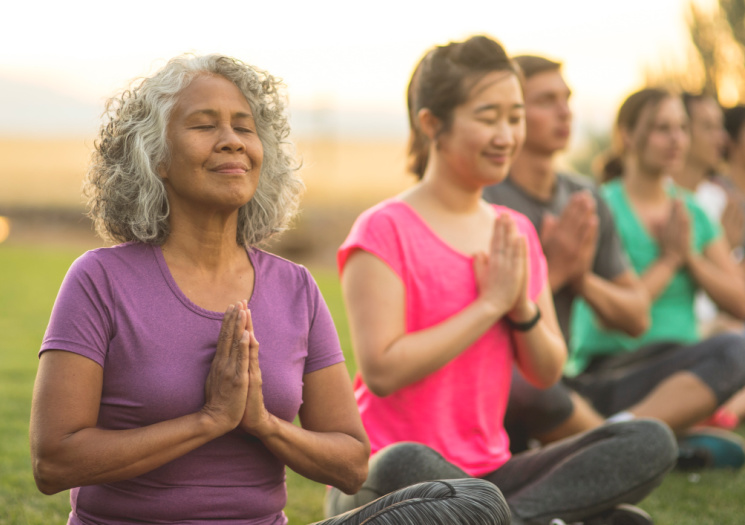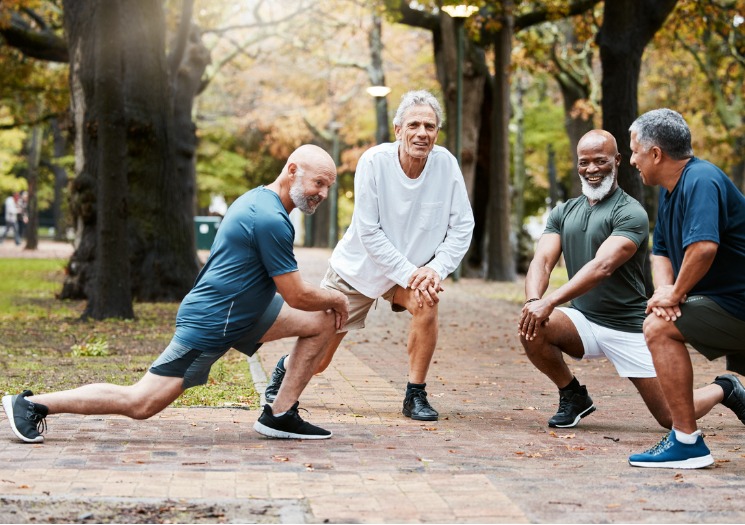- Find a Provider
-
Services
-
Redeemer Health provides compassionate care across every stage of life.
- View all Services
- Health Care
- Cancer Care
- Heart Care
- Hospital at Home
- Maternity Care
- Pediatric Urgent Care
- More Health Care Services
-
- Patients & Visitors
- Locations
- Careers
Taking Steps to Better Health: The Benefits of Walking
August 30, 2022
categories:

Walking is one of the most accessible forms of exercise. Other than a sturdy pair of sneakers, you don’t need any special equipment, and the activity offers a multitude of health benefits. Plus, it’s free!
“Walking is such good exercise for most people because it is our most basic form of transporting the body,” says exercise physiologist Robert Catalini, manager of the Health and Fitness Center and Pediatric Rehabilitation at Redeemer Health.
Before starting on a walking regimen, Catalini says, people with conditions such as heart disease, hypertension, diabetes, or a history of stroke should get an all-clear from their doctor. And those who aren’t used to exercise should start gradually, perhaps with a five-minute stroll to the end of their block and back. Then go a little farther the next day. “Gradually increase your time,” Catalini says. “There’s no rush. Getting some form of exercise is better than nothing at all.”
Need incentive to get moving? Consider the following benefits.
- Trim excess inches: Being overweight can predispose you to other health issues. Walking a mile—which takes 15 to 30 minutes—burns about 100 calories. That means if you walked a mile every day, you would burn 36,500 calories in a year, which translates to losing 10 pounds. Plus, studies have found that walking reduces cravings for sugary foods.
- Improve heart health: A brisk daily walk elevates your heart rate and reduces your risk of problems such as high blood pressure, high cholesterol, heart attack, and stroke. Walking daily has been shown to reduce the risk of heart disease by 30 to 50%, but walking even a few times a week reduces that risk by 15 to 20%.
- Lower blood sugar: When you walk, your muscles use more glucose, the sugar in your bloodstream. Over time, this can lower your blood sugar levels. It also allows insulin to be used more effectively.
- Boost your mood: Joggers talk about the “runner’s high,” but you also can get a psychological boost from moving at a slower pace. Walking is reported to increase happiness and reduce anxiety, and a 2019 study published in JAMA Psychiatry found that walking for an hour a day can reduce your risk of major depression.
- Add years to your life: Walking is linked to a longer lifespan. A major study published in 2020 in JAMA found that the more steps participants over age 40 took, the lower their risk of dying from any causes. Taking into account subjects’ health, researchers found a 51% lower mortality risk for those who took 8,000 steps a day compared with those who took 4,000.
Walking is also known to reduce pain and boost your immune system. "The exercise is like medicine," Catalini says.
He encourages individuals to come up with a walking program to suit their physical condition, schedule, and lifestyle. "If it doesn't fit your lifestyle, you're not going to continue it," he says. "Your walking program becomes part of your lifestyle by being part of your routine."
Having a walking buddy or belonging to a walking group can help get you out the door. “If you have friends or neighbors that you can say, ‘Hey let’s go for a walk,’ I think that’s a great thing to do,” Catalini says. “Now it becomes a social thing as well as a physical thing.”
Walkers also can get their steps in while supporting a worthy cause at events such as the fundraising walks Redeemer Health will hold this fall at Bryn Athyn College. The Kohl's + Redeemer Health NICU 6K Walk /Run on September 24 will support Redeemer’s Neonatal Intensive Care Unit. The Hope is Here: 2022 Breast Cancer Awareness Walk on October 15 will support the breast health programs at Redeemer Health in partnership with MD Anderson Cancer Center at Cooper.
Wherever and whenever you elect to walk, Catalini offers the following tips to help ensure a safe and positive experience:
- Invest in proper footwear. The professionals at your local running store should be able to help.
- Consider walking indoors, on a treadmill or at a mall, during inclement weather.
- Avoid walking in the middle of the day in the summer, when it tends to be hottest.
- Be sure to hydrate.
Now all that's left is to take the first step.



